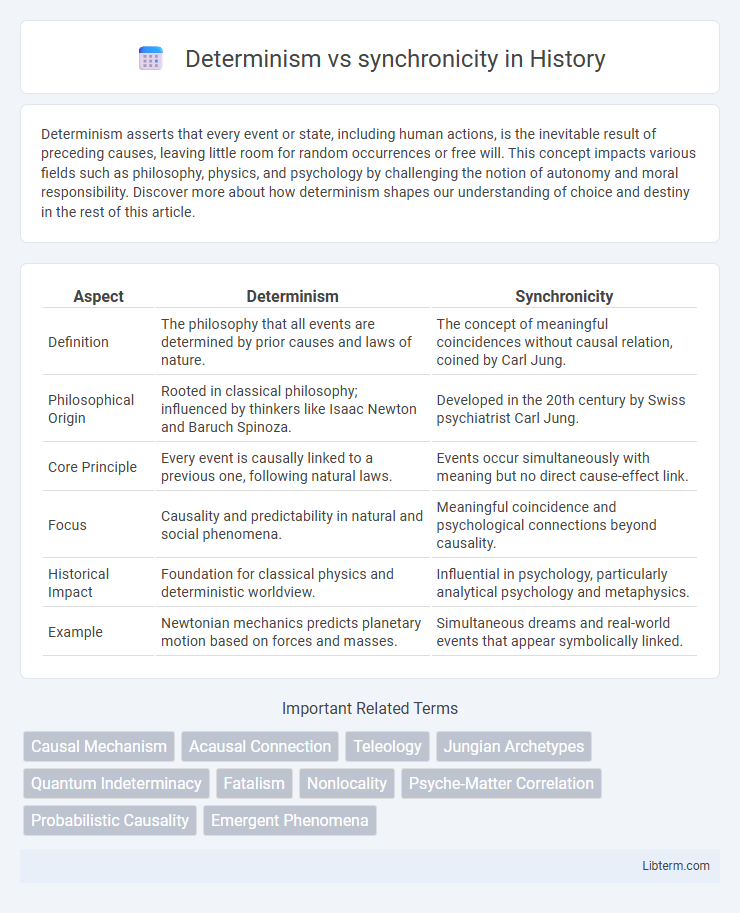Determinism asserts that every event or state, including human actions, is the inevitable result of preceding causes, leaving little room for random occurrences or free will. This concept impacts various fields such as philosophy, physics, and psychology by challenging the notion of autonomy and moral responsibility. Discover more about how determinism shapes our understanding of choice and destiny in the rest of this article.
Table of Comparison
| Aspect | Determinism | Synchronicity |
|---|---|---|
| Definition | The philosophy that all events are determined by prior causes and laws of nature. | The concept of meaningful coincidences without causal relation, coined by Carl Jung. |
| Philosophical Origin | Rooted in classical philosophy; influenced by thinkers like Isaac Newton and Baruch Spinoza. | Developed in the 20th century by Swiss psychiatrist Carl Jung. |
| Core Principle | Every event is causally linked to a previous one, following natural laws. | Events occur simultaneously with meaning but no direct cause-effect link. |
| Focus | Causality and predictability in natural and social phenomena. | Meaningful coincidence and psychological connections beyond causality. |
| Historical Impact | Foundation for classical physics and deterministic worldview. | Influential in psychology, particularly analytical psychology and metaphysics. |
| Example | Newtonian mechanics predicts planetary motion based on forces and masses. | Simultaneous dreams and real-world events that appear symbolically linked. |
Understanding Determinism: The Philosophy of Cause and Effect
Determinism is the philosophical theory that every event or state of affairs, including human decisions and actions, is the inevitable result of preceding causes. It asserts a linear cause-and-effect relationship where all phenomena are predetermined by prior conditions, leaving no room for randomness or free will. Understanding determinism involves analyzing the laws of nature and initial conditions that govern the universe, emphasizing predictability and systematic order in all occurrences.
Synchronicity Defined: Jung’s Concept of Meaningful Coincidences
Synchronicity, defined by Carl Jung, refers to the occurrence of meaningful coincidences that are not causally connected but hold significant psychological or symbolic relevance. Unlike determinism, which relies on cause-and-effect relationships governed by natural laws, synchronicity suggests an acausal principle where events are linked by meaning rather than by direct causation. This concept challenges traditional scientific paradigms by emphasizing the interconnectedness of the inner psyche and external reality through meaningful, simultaneous occurrences.
Historical Roots: Origins of Determinism and Synchronicity
Determinism traces its origins to ancient Greek philosophy, with figures like Democritus and later, the Stoics, asserting that all events are causally determined by preceding factors. Synchronicity, a concept introduced by Carl Jung in the early 20th century, emerged from analytical psychology and Eastern philosophies, emphasizing meaningful coincidences without causal relationships. The historical interplay between deterministic causality and synchronicity reflects enduring debates on fate, free will, and the nature of reality in Western and Eastern thought.
Key Differences Between Determinism and Synchronicity
Determinism asserts that every event or state is the inevitable result of preceding causes, emphasizing a causality-based, predictable universe governed by natural laws. Synchronicity, coined by Carl Jung, describes meaningful coincidences that lack a causal relationship but hold psychological significance, highlighting an acausal connecting principle in human experience. The key difference lies in determinism's focus on cause-and-effect chains versus synchronicity's emphasis on meaningful, non-causal connections beyond linear explanation.
Scientific Perspectives on Causality and Coincidence
Scientific perspectives on determinism emphasize causality as a predictable chain of events governed by natural laws, where every effect has a preceding cause. Synchronicity challenges this view by suggesting meaningful coincidences occur without causal relationships, proposing an acausal connecting principle. Research in quantum mechanics and complexity theory explores these phenomena, examining whether coincidence can be systematically distinguished from deterministic causation.
Determinism in Modern Psychology and Neuroscience
Determinism in modern psychology and neuroscience asserts that all human behavior and mental processes are governed by causal laws and neural mechanisms, leaving no room for randomness or free will. Research in neurobiology supports this by identifying specific brain structures and neurotransmitter pathways that predict decision-making and behavior with increasing accuracy. This framework challenges traditional notions of personal agency, emphasizing that cognition and actions arise from prior states of the brain and environmental inputs.
Synchronicity in Spirituality and Personal Growth
Synchronicity in spirituality and personal growth refers to meaningful coincidences that appear to guide individuals toward deeper self-awareness and life purpose. These events are often interpreted as signs from the universe, reflecting an interconnectedness beyond cause-and-effect determinism. Embracing synchronicity can enhance spiritual awakening and promote intuitive decision-making, fostering transformative experiences and inner alignment.
Real-World Examples: Deterministic Events vs. Synchronicities
Deterministic events manifest in predictable outcomes, such as the precise orbits of planets governed by Newtonian physics, exemplifying cause-and-effect relationships. Synchronicities occur in seemingly meaningful coincidences without causal linkage, like unexpectedly meeting a future collaborator in an unrelated setting, suggesting connections beyond deterministic logic. Real-world distinctions highlight deterministic processes in technology, like algorithmic decision-making, versus synchronous experiences in human interactions and psychological phenomena.
Implications for Free Will and Human Experience
Determinism posits that every event, including human decisions, is caused by preceding factors, suggesting that free will is an illusion constrained by natural laws. Synchronicity, as introduced by Carl Jung, implies meaningful coincidences that are not causally connected, offering a perspective where human experience includes elements beyond strict causal determinism. The tension between these concepts challenges traditional views on autonomy, highlighting the complexity of human agency and the subjective nature of meaningful experiences.
Integrating Determinism and Synchronicity: Toward a Holistic View
Integrating determinism and synchronicity offers a holistic framework that acknowledges causal chains alongside meaningful coincidences without causal links. This approach emphasizes patterns and connections that reveal deeper insights beyond linear cause-effect relationships, blending objective laws with subjective experiences. Such integration fosters a nuanced understanding of reality where predetermined mechanisms coexist with unpredictable, meaningful events.
Determinism Infographic

 libterm.com
libterm.com